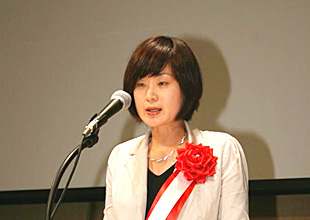 The Winner of the Ninth Asia Pacific Research Prize (Iue Prize) : Dr. Youn-Soo Cho
The Winner of the Ninth Asia Pacific Research Prize (Iue Prize) : Dr. Youn-Soo Cho
Title of Dissertation : International Politic of the Korean-Japanese Fishery Negotiation - Decolonization of Sea Order and mediation of 'National Interests'

- Dr. Youn-Soo Cho
-
- Career -
Youn Soo Cho, is a Research Fellow at Northeast Asian History Foundation. Before coming to NAHF in 2009, Dr. Cho was a post-doctoral Fellow at Institute of Japanese Studies in Kookmin University. Her research is concentrated on the modern and contemporary international relations of the Asia-Pacific region particularly Korea and Japan. Her recent publications is Diplomatic document Disclosure and evaluation of Korea-Japan Talks (2010) in Institute of Japanese Studies in Kookmin University(eds.). She received Ph.D. from the Tohoku University in 2008.
- Summary -
- International politic of Korean-Japanese Fishery Negotiation
- Decolonization of Sea Order and mediation of 'National Interests' - -
This paper contains an analysis of Korean policy toward Japan concerning negotiations of fishing rights between the two countries throughout the fourteen years up until relations between the two countries were normalized in 1965 based on documents concerning foreign relations between Japan and Korea, primarily the more than 35,000 pages of documents recently released by the Korean government.
Prior research of the so-called "Syngman Rhee line" was roughly divided into the assertion that the line was a bargaining chip and the assertion that it was a measure to secure substantial benefits for Korea in the form of expanded fishing area. Both however have in common a fact that the Syngman Rhee line can be interpreted as being based on anti-Japanese sentiment due to historical antagonism between the two countries. While Korea was liberating itself from the bonds of colonialism after gaining independence from Japan, Japan continued to project the image of an expansionist country. The sentiment of the Korea side gave birth the a sense of vigilance toward post-war Japanese economic control, and significantly impacted negotiations concerning fishing rights, which is directly connected to the marine products industry, Korea's sole field of export at the time. The recently released documents confirmed that the sense of vigilance toward Japan was maintained during the time up to the third round of negotiations and that the Korean side recognized the encroachment of the MacArthur line as an incursion of Korean waters by a Japanese fishing vessel.
Such severe antagonism between Japan and Korea began to change beginning with the fourth round of negotiations, when Syngman Rhee began to use the Syngman Rhee line as a sort of bargaining chip. The change in the attitude of the Korean side came as a result of the change in circumstances, namely the reduction of American economic and, military assistance. After that, Korea set about to redefine the meaning of "national interest". Although it became the "prevailing notion" that fishing negotiations had been sacrificed for compensation negotiations after the sixth discussion following establishment of the Chunghee Park administration, a scrupulous analysis of the documents shows equality between fishing and compensation negotiations and the shows that each had its own significance and importance.
Past research has suggested that, from the standpoint of pragmatism, American intervention under cold war conditions enabled Japan-ROK negotiations, that the anti-Japanese policy of Syngman Rhee made it impossible to reach an agreement in bilateral talks, and that Chunghee Park's pro-Japan stance enabled negotiations between the two countries. However, the fact that the Korea’s attitude toward Japan has turned positive since Chunghee Park administration, despite the negative attitude that Korea maintained in early bilateral talks with Japan is attributable to the fact that Korea redefined the concept of "national interest". In other words, the novelty of this research is in the fact that it points out that the concept of "national interest" gradually changed since the positive change in policy toward Japan in later Japan-ROK fishing negotiations of the Syngman Rhee administration up to the time of the Jang Myeon administration and the Chunghee Park administration.






